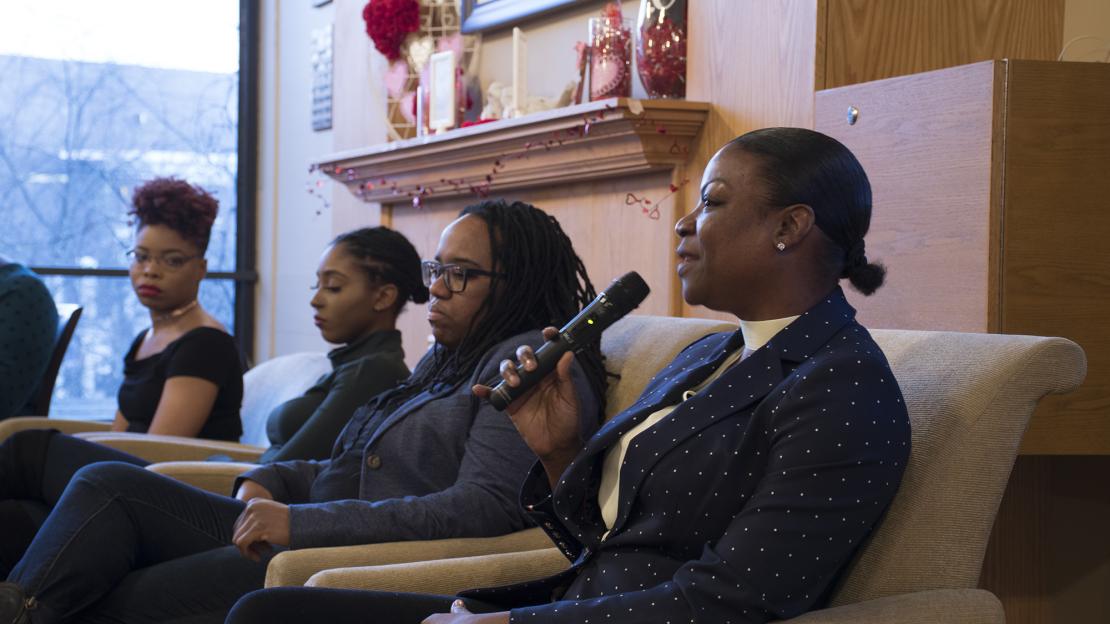North American beauty standards are not created equal. For Black women in particular, even the choice of hair arrangement can be seen as a political one.
This was the motivation behind a recent panel discussion on the Politics of Black Beauty held at U of T Scarborough where students had the opportunity to ask experts about perceptions of beauty and how it relates to race.
“We wanted to focus on beauty, and not only on the putting on and removing of makeup and doing our hair, but the nuances as to why we do what we do and why it’s so important for a lot of people,” says Katherina Boyd, a mentor in the IMANI Academic Mentorship Program and fifth-year student at U of T Scarborough.
“We wanted to focus on beauty, and not only on the putting on and removing of makeup and doing our hair, but the nuances as to why we do what we do and why it’s so important for a lot of people,” says Katherina Boyd.
Hosted by the Scarborough Campus Students’ Union (SCSU) in partnership with the IMANI Academic Mentorship Program, the event promoted an open conversation on topics such as beauty, media and the skin and hair industry as it relates to issues of shadesim and colourism in the Black community.
Shadeism and colourism are often interchangeable terms that describe discrimination that occurs between so-called dark-skinned and light-skinned members of a community.
“Recently movies like Get Out and now Black Panther have revolutionized how we think and talk about Black films, and prove that films about Black people and featuring dark-skinned Black people can be successful,” said Boyd.
Panelists included educator and writer Dr. Cheryl Thompson, and business owner and writer Dr. Nadine Wong. Thompson is a Banting Postdoctoral fellow at U of T working with Dr. Stephen Johnson in U of T Mississauga’s Department of English & Drama and the Centre for Drama, Theatre and Performance Studies at the downtown Toronto campus. During the event, she provided historical context for questions surrounding what Black beauty means today.
In her responses to panel questions, Wong, founder of Alabaster Wellness Clinic and author of What If Your Hair Could Speak, What Would it Say? discussed the importance of holistic care – caring for the body and mind – to achieve beauty goals, explaining that the appearance of hair can demonstrate the food a person consumes, stress level and other indicators.
The remaining panelists were young Toronto-based entrepreneurs, T’kehya Prentice-Cupid and Tiffani Nelson. Prentice-Cupid, hairstylist and founder of TK Natural Hair Wigs, advocated for natural hair care. Nelson, a makeup artist based in Toronto, Canada, said women should have diverse options when it comes to makeup products.
BLACK HISTORY MONTH EVENTS AT U OF T SCARBOROUGH RUN UNTIL MARCH 8. READ MORE HERE.
“It was good to hear from Dr. Wong, about the chemicals that affect your body, and from Dr. Thompson about the history behind black hair care and makeup,” says Kzzia Williams, a first-year student studying sociology and mental health studies.
“It was also nice to hear from T’kehya about natural hair, and Tiffani about products in the beauty supply store, and finding products for women that look like me.”
This year, SCSU collaborated with several groups for Black History Month events on topics such as Black mental health, being queer in the Black community and beauty.
“We hope people in the audience take what they learned back to their friends and continue having these kinds of conversations – I know my friends and I will be discussing these topics forever.”
